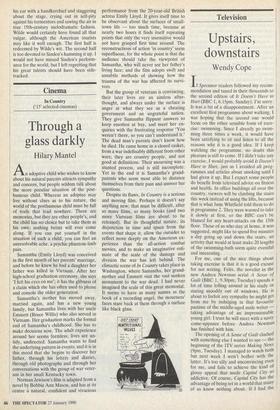Cinema
In Country (`15' selected cinemas)
Through a glass darkly
Hilary Mantel
An adoptive child who wishes to know about his natural parents attracts sympathy and concern, but people seldom talk about the more peculiar situation of the post- humous child. Whereas an adoptee may live without clues as to his nature, the world of the posthumous child must be full of trails that lead nowhere. There are memories, but they are other people's, and the child has no choice but to take them as his own; nothing better will ever come along. If you can put yourself in the situation of such a child, you can feel an unresolvable ache, a psychic phantom-limb pain.
Samantha (Emily Lloyd) was conceived in the first month of her parents' marriage, and before he knew he had a daughter her father was killed in Vietnam. After her high-school graduation ceremony, she says `I felt his eyes on me'; it has the glibness of a claim which she has often used to please and console the older generation.
Samantha's mother has moved away, married again, and has a new young family, but Samantha lives with her uncle Emmett (Bruce Willis) who also served in Vietnam. Her graduation marks the formal end of Samantha's childhood. She has to make decisions now. The adult experience around her seems formless; lives are un- tidy, undirected. Samantha wants to find the underlying pattern in events; and it is in this mood that she begins to discover her father, through his letters and diaries, through old photographs and through her conversations with the group of war veter- ans in her small Kentucky town.
Norman Jewison's film is adapted from a novel by Bobbie Ann Mason, and has at its centre a natural, confident and vivacious
performance from the 20-year-old British actress Emily Lloyd. It gives itself time to be observant about the surfaces of small- town life — too much time, because at nearly two hours it finds itself repeating points that only the very insensitive would not have grasped first time around. The reconstructions of action 'in country' seem superfluous, for the whole point is that the audience should take the viewpoint of Samantha, who will never see her father's living face; and the film adopts swift and unsubtle methods of showing how the trauma of the war has affected its survi- vors.
But the group of veterans is convincing; their later lives are an aimless after- thought, and always under the surface is anger at what they see as a cheating government and an ungrateful nation. They give Samantha flippant answers to keep emotion at bay, and meet her en- quiries with the frustrating response 'You weren't there, so you can't understand it.' The dead man's parents don't know how he died. He came home in a closed casket, from a war indefinably different from other wars; they are country people, and not good at definitions. Their mourning was a stunted process, and is still incomplete. Yet in the end it is Samantha's grand- parents who seem most able to distance themselves from their pain and answer her questions.
Despite its flaws, In Country is a serious and moving film. Perhaps it doesn't say anything new; that must be difficult, after so many films, so many books (and two more Vietnam films are about to be released). But its thoughtful nature, its disjunction in time and space from the events that shape it, allow the outsider to reflect more deeply on the American ex- perience than the all-action combat movies, and to make an imaginative esti- mate of the scale of the damage and division the war has left behind. The climactic scene of In Country takes place in Washington, where Samantha, her grand- mother and Emmett visit the vast sunken monument to the war dead. I had never imagined the scale of this great memorial. It seems to have as many names as the book of a recording angel; the mourners' faces stare back at them through a surface like black glass.


























































 Previous page
Previous page